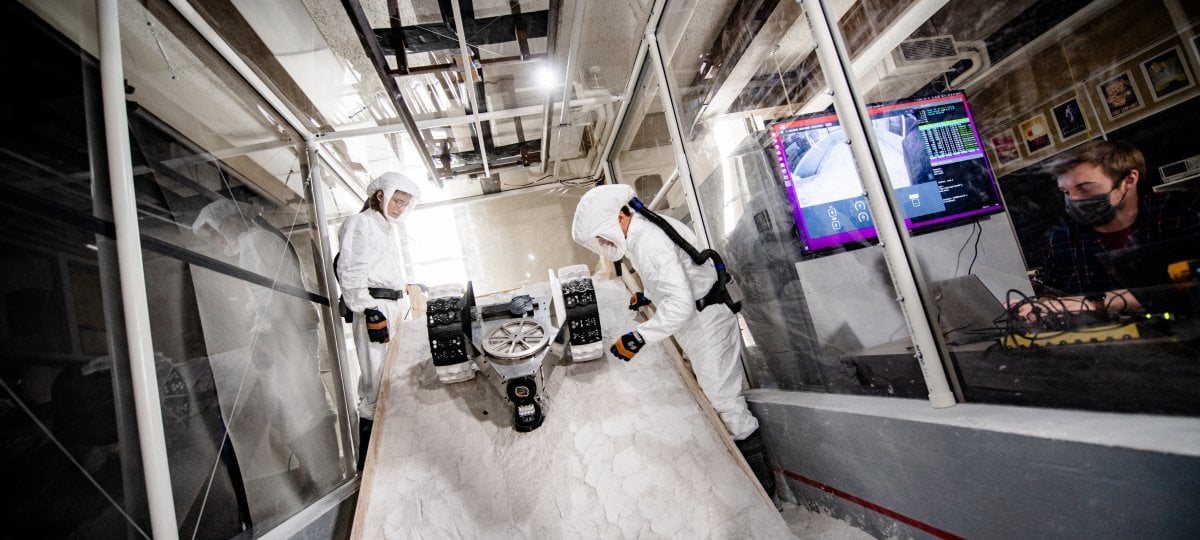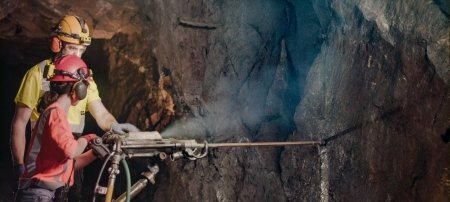With the help of talented faculty, experiential opportunities and industry-guided curriculum, Huskies are ready to take to the stars. Starting in fall 2025, undergraduate students can pursue a Bachelor of Science in Aerospace Engineering at Michigan Technological University.
Michigan Tech has established itself as a beacon for innovation and expertise in the aerospace engineering field — and now students can apply for the University's new Bachelor of Science in Aerospace Engineering degree program for the 2025-26 academic year. The program is housed in the Department of Mechanical and Aerospace Engineering (MAE) within the College of Engineering. The chair of the department, Distinguished Professor Jason R. Blough, is ready to welcome this first class of future aerospace engineers.
"The addition of this new degree is in recognition of the expertise of our faculty, growing research in the areas of aerospace and space technology and engineering, and a tremendous amount of student interest," said Blough. "We are very excited to welcome our first freshman class into Aerospace Engineering in the fall of 2025!"
While the new bachelor's degree is Tech's first official aerospace engineering program, it expands on a wealth of existing aerospace engineering opportunities available to students. MAE continues to offer an undergraduate minor in aerospace engineering, and the University's Air Force ROTC program has a minor in aerospace studies. Michigan Tech's Enterprise Program, a project-based experience in which undergraduate students on multidisciplinary teams work on real projects for real clients, also includes two aerospace engineering teams. Students on the Aerospace Enterprise team work on space mission design and analysis, vehicle integration and systems engineering. The Oculus-ASR Microsatellite, one of the team's recent spacecraft projects, was launched aboard a SpaceX Falcon Heavy in 2019 to serve as an imaging calibration target for ground-based observatories tasked with characterizing spacecraft. The Multiplanetary INnovation Enterprise (MINE) Enterprise team members design, test and implement robotic technologies for use in extreme environments. Additionally, a new Enterprise team encompassing two student organizations — SAE Aero Design Team and the Keweenaw Rocket Range (KRR) — will bring a fresh competitive angle to the University's experiential learning opportunities.
In addition to hands-on product development, aerospace engineering students at Michigan Tech will have the opportunity to collaborate on research projects with faculty and researchers in the Space Systems research group. The Michigan Tech Aerospace Engineering Research Center (MARC) serves as a focal point and arm of support for aerospace engineering activities on campus. The Planetary Surface Technology Development Lab (PSTDL) develops technology solutions for surface exploration of the moon, Mars and beyond while training the next generation of engineers. The Ion Space Propulsion Lab (ISP Lab) involves next-generation plasma thrusters for spacecraft.
"Our students have been asking for this degree and we listened. We're thrilled to launch the new Aerospace Engineering degree here at Tech. With the technical chops and innovative, hands-on focused curriculum to train the next generation of aerospace engineers, the sky is no longer the limit as our students tackle tomorrow's space and aircraft needs. We can't wait to get started!"
College of Engineering Dean Michelle Scherer said the new bachelor's in aerospace engineering will be a launching pad for many engineers to come. "From satellites to autonomous flight to aircraft design, the Michigan Tech College of Engineering is leading the pack in all things aircraft and space," she said.
For more information on the new degree's curriculum and aerospace engineering careers, explore Michigan Tech's Aerospace Engineering site.
Michigan Technological University is an R1 public research university founded in 1885 in Houghton, and is home to nearly 7,500 students from more than 60 countries around the world. Consistently ranked among the best universities in the country for return on investment, Michigan's flagship technological university offers more than 120 undergraduate and graduate degree programs in science and technology, engineering, computing, forestry, business, health professions, humanities, mathematics, social sciences, and the arts. The rural campus is situated just miles from Lake Superior in Michigan's Upper Peninsula, offering year-round opportunities for outdoor adventure.






Comments